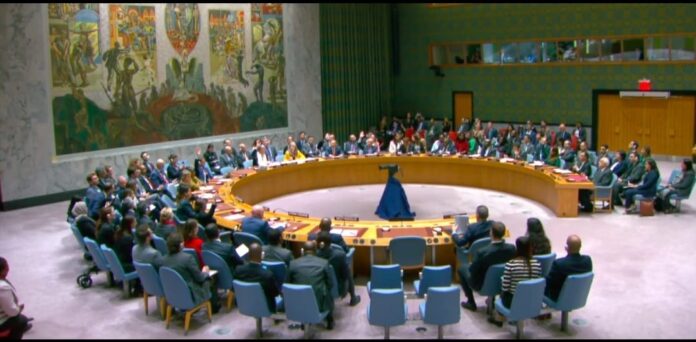The Russian-led draft resolution at the UN Security Council received five votes in favor (China, Gabon, Mozambique, Russia, and the United Arab Emirates) and four votes against (France, Japan, the United Kingdom, and the United States), with six abstentions (Albania, Brazil, Ecuador, Ghana, Malta, and Switzerland).
The draft resolution called for a humanitarian ceasefire, the release of hostages, aid access, and the safe evacuation of civilians. However, it failed to reach the necessary nine votes in favor, with no vetoes from permanent members, for adoption.
Russian Ambassador Vassily Nebenzia expressed regret over the failure to adopt the resolution and blamed the “selfish intention of the western bloc” for obstructing efforts to end the violence.
He highlighted that the vote revealed divided support for ending the violence and providing humanitarian aid, hinting at political and self-interest obstructing a unified stance.
The US Ambassador, Linda Thomas-Greenfield, opposed the Russian draft resolution, arguing that it failed to condemn Hamas’ terrorism and disregarded the victims.
She criticized Russia for providing cover to a terrorist group and accused Hamas of brutalizing civilians and causing a dire humanitarian crisis. Thomas-Greenfield emphasized the need for the Council to hold Hamas accountable.
Palestinian Ambassador Riyad Mansour called on the Security Council to adhere to international law and stressed the importance of recognizing the value of Palestinian lives. He condemned Israel’s actions and characterized the situation in Gaza as a full-scale assault and massacre against innocent civilians.
Israeli Ambassador Gilad Erdan highlighted the pivotal moment at the Security Council and accused Hamas of being a terror organization driven by an ideology similar to that of the Nazis.
He called on the Council to designate Hamas as a terrorist organization, hold it accountable for the situation in Gaza, and support Israel’s right to defend itself.
One thing is quite clear that the Security Council members are deeply divided on addressing the conflict in Gaza, with differing perspectives on Hamas’ role, Israel’s actions, and the way forward to achieve a ceasefire and protect civilian lives.
Mohamed Mohamoud Adde is an academic and a political Analyst specialising in offering expert analysis, insight and recommendations on Political developments.


